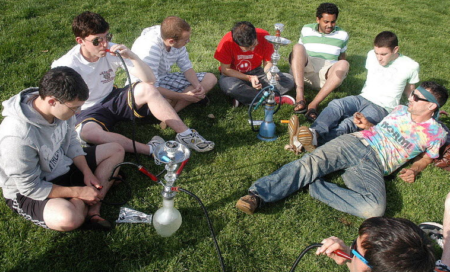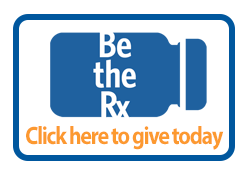A degree in pot, fighting nicotine withdrawal, teens and mango, and more
07 Nov 2019
Posted by Andrew Kantor
M.Pot
The University of Maryland School of Pharmacy is launching the first program in the country to offer a master’s degree in medical cannabis.
[The program] covers everything from drug policy to clinical care. While students aren’t directly exposed to the marijuana plant, which is illegal under federal law, they will learn about the science behind the compounds that are found in it, like THC and CBD. “We’ll talk about how they’re metabolized. We’ll talk about potential drug-drug interactions that might take place between THC and a drug, or CBD and a drug.”
Marijuana is decriminalized in Maryland, meaning possession of fewer than 10 grams only gets you a ticket.

Course study break (artist’s conception)
(H/T to Blair Curless, who pointed us to the story.)
Another Medtronic insulin-pump recall
This one is “the most serious type of recall” — the Medtronic MiniMed Model 500 Remote Control and 503 Remote Transmitter.
An unauthorized person […] could potentially record and replay the wireless communication between the remote and the MiniMed insulin pump. This person could instruct the pump to either over-deliver insulin to a patient, leading to low blood sugar (hypoglycemia), or stop insulin delivery, leading to high blood sugar and diabetic ketoacidosis, even death.
Help for smoking rodents
Rats and mice that are addicted to nicotine might be helped with a little chemistry: pioglitazone to be specific. The diabetes drug “abolishes the characteristic signs of nicotine withdrawal” according to a new Italian study. So if you have some pets suffering from withdrawal, you know where to turn.
Opioid Safety Champions — and champions like you

The Georgia Pharmacy Foundation launched a new, free path to equip pharmacists to become Opioid Safety Champions this year. It’s one of the many ways the foundation provides opportunities for pharmacists across Georgia. Your donation today will strengthen this program as well as help us continue to provide high-quality CE for pharmacists.
Thanks to everyone who contributed to the foundation’s Annual Giving Campaign so far — we hit $4,200 since Oct. 1! We still need to raise an additional $5,800 by the end of the year. Whether you give $50, $100, or $500, a donation can make a big impact on pharmacists and the communities you serve.
Become an Opioid Safety Champion: GPhA.org/opioidsafety
High times
CVS — working with UPS and a drone-logistics company — has delivered the first prescription meds by autonomous drone. Of note: This was the first prescription med delivery (other companies have been testing OTC-med delivery), and the drone was autonomous, although a human was watching just in case. The CVS receipt was delivered separately by tractor-trailer.
Although there’s a coolness factor at play here, the official reason for experimenting with drone delivery is to be able to serve patients who need meds, don’t have a healthcare provider nearby, cannot wait for mail delivery, and are unable to get to a store.
Naloxone in the air
The FAA is considering requiring that naloxone be carried on all passenger aircraft. (Currently it’s allowed, but not required.)
Mango? Really?
Teens who vape prefer mint and mango flavors. We have no clue what you might do with this news, but it just seemed like an interesting watercooler fact. And the folks at USC took the time to do the study, so might as well share it. (Do they even have watercoolers anymore?)
Today’s obvious story
Expanding Medicaid — giving more people access to healthcare — reduces hospitalizations overall.
Researchers estimated that the Medicaid expansion led to a 3.47% reduction in annual discharge rates for ambulatory care-sensitive conditions that range from diabetes and heart failure to infections or pneumonia.



